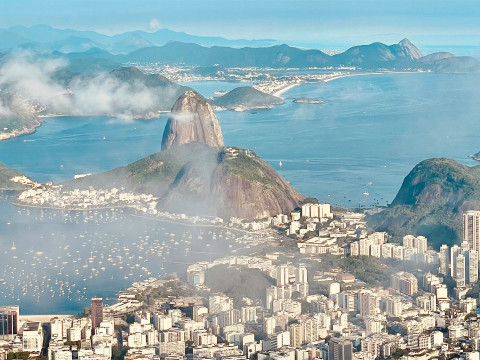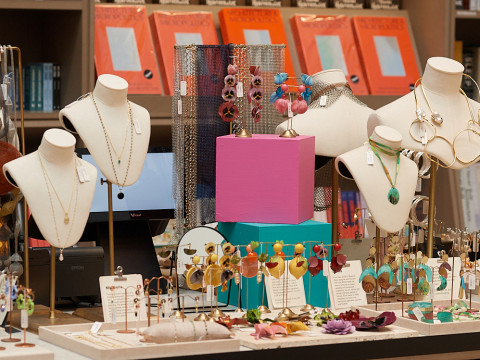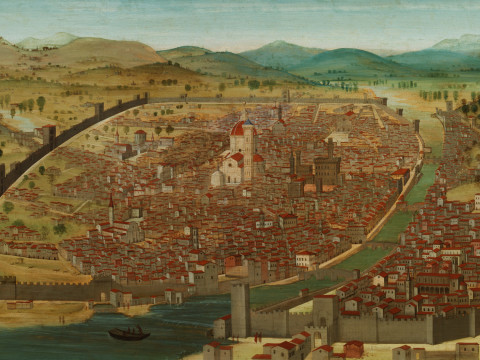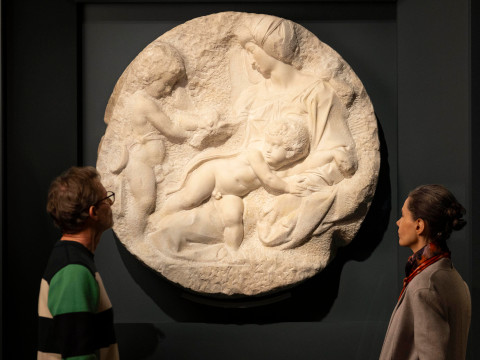
RA Schools students discuss their upcoming final show
By Sam Phillips
Published on 5 June 2014
As students from the RA Schools prepare for their final show, what are their feelings about leaving after three intensive years of study? Some of them discuss the issues they face with Schools tutor Brian Griffiths and Phyllida Barlow RA, who has been involved in art education for 45 years.
Phyllida Are we, as artists, completely ruled by institutions such as art schools? And if so, do we need such institutions?
Brian Well, these are massive questions.
Phyllida Because you can’t be more institutional than the RA, can you? The RA would be up there with Tate, or the National Gallery, and I find the way these institutions can lead the process of being an artist quite scary. When you came to the RA Schools, did you think it was going to work some sort of magic for you as an institution, or did you want to work the magic?
Brian In order to discuss that, we should ask: why did you all apply here? Was there a particular reason? Was it because it’s free?
Daniel For me it was a lot to do with it being free. I had been out of art education for four years and by myself in a studio, and it was quite tough having to take time out of my studio to earn enough to pay for it. I also wanted to come here because it was small. I had been at Goldsmiths for my BA and, for me, that course was too big – there was one moment when I had to present my work to 50 people, and having a large number of responses didn’t help.
Marisa What was very attractive for me, and probably for a lot of other people, was the fact that it’s a three-year postgraduate course. That’s rare, and having had a lot of time out of education meant I wanted as much school as I could get.
Alex (Clarke) I also think the RA Schools felt a bit less like a brand than other art schools. Even though it’s an old institution, it has changed very recently and how it is today is not a brand.
Marisa In a way, that makes it less institutional. On the inside it feels to me a lot less institutional than other art schools. Because it’s small, it’s private, it’s independent – it can kind of do what it wants and things can just happen on the fly.
Phyllida Do they? That’s interesting.
Brian The course doesn’t have an exam, as we’re not affiliated to a university. In this country’s increasingly bureaucratic educational system, this independence allows the RA Schools to be more flexible, more responsive to the students who are here, or to the changing ideas in art.
Coco The course is also cross-disciplinary, allowing us privileged insights into each other’s processes of working. There are many different types of practice, some of which contrast greatly, others which cross over and have similarities.
Julie It has been important that we, as students, have suggested which artists could come in and talk to us. That has allowed our experience to be very varied over the three years.
Phyllida But why do you need interesting artists to come in and talk to you about your work? Why do you need an art school to approve your work?

Natalie Although the RA is globally recognised as something that can value art, the process of actually making art here is never solely about approval. That only took place right at the beginning when I came for an interview, but I always had it in mind that I could behave in an antagonistic way once I was inside the building. There’s a weird negotiation, like a constant flipping between seeking approval and having an argument.
Aimee It’s a really complex thing – you’re not going to feel secure in this institution the whole time, you’re going to feel conflicted at points. Phyllida What is the RA as an institution? Is it this building, or the sum total of its history?
Brian It’s a multitude of shifting ideas and different perceptions. The perception in London of the RA is very different from, say, America.
Aimee And the RA is always changing. It has changed so much over the past 10 or 20 years.
Natalie But we’re approaching the whole idea of the institution from quite a critical angle here. I love the romance, the history of old artists who I can’t relate to but who would have walked around the Academy having conversations that we can’t really imagine. There are splices of myths and fictions we can find within the building.
Brian It’s the Harry Potter of art schools, isn’t it? You bump into that idea here on a daily basis, whether it’s an Academician wandering past wearing a medal, or seeing an engraved list of the names of the artists who’ve studied here. The history of the place is very tangible.
Alex Because this history is acknowledged, it enables us not to have to worry about it. I think if this history was more invisible we would be more conscious of it.
Natalie The weight of the history could have been scary, overwhelming and crushing, but because you’re here for three years you have the time to get over it. You can see it as a challenge, and it helps focus and gives confidence.

Phyllida I would be the first person to admit I’m totally institutionalised, as I have taught in art schools for 45 years. But there are other highly institutionalised components that make up the art world – like Frieze Art Fair, for example – and on a personal level I’ve only come up against these recently. But ‘being institutionalised’ here is not seen as a negative thing?
Natalie That term assumes we’re not in control, like there’s no autonomy any more, and I don’t agree with that. The reason the Royal Academy has this status of being able to value new art is because of its history, which has been built by all sorts of individuals and probably by diverging and argumentative minds. We’re here now, having the chance to take part in that renegotiation of what an institution is, and others will too after us.
Gabriel We’re the institution, the 16 of us. I see myself existing within this group on a day-to-day basis rather than being defined by the gold crest of an institution.
Natalie We’ve become this place. History helped build this place, but we fill it now and it becomes what we collectively make it.
Julie We can shape it.
Phyllida Can you? You say you become this place.
Natalie Or it becomes us. It is constantly changing and depends on how we each choose to act while we’re here, and what that produces when our different actions collide.
Aimee I think the scale of the Schools is important as well. Because there are so few of us, we can be individuals – we don’t each feel like we’re another number. Each year is different in terms of individuals, and that makes the Schools different from year to year.
Phyllida I’m still curious about why the word ‘course’ sends shudders through me. Why, after one has done a BA course, do you suddenly need another one, two, three years of yet another course? Could someone just go on a course like this for access to the studio space?
Marisa I think if someone just wants the space they can rent a studio.
Phyllida They can’t because it costs money.
Marisa It’s about more than just the space.
Julie It’s about the conversations between us.
Natalie We challenge each other. We’ve had to be together for three years and we can say provocative things to each other.
Phyllida What form does that take?
Gabriel In sessions called ‘crits’, where we talk about art and about one another’s work. They can take place as a group or one-to-one with each other, or with visiting artists.
Natalie These crits are quite impassioned, and it’s quite natural for us to fall out. But you grow to tolerate each other’s opinions and start to appreciate other’s way of seeing an artwork, and that kind of strengthens your own argument.

Phyllida What ambitions do you have for your work, now that you’re about to leave the Schools?
Brian I imagine some people here will be so focused on developing their art at the moment that they haven’t thought about showing at galleries afterwards.
Marisa In the past 10 years people in art schools have begun to feel that being represented by a gallery is a reasonable expectation. But that’s where everyone gets into trouble, when they expect that to be waiting out there – that sets you up for disappointment.
Aimee I wouldn’t have thought that’s the focus of most people at this point. You’re thinking about the show and how you’re going to operate outside of this group that you’ve been with for three years: if you’re going to have a studio, who your new peers are going to be, who you are going to stay in touch with, and how all that is going to change your work.
Julie And how to survive – getting enough money but not doing too many jobs so that you can still have time for your own practice.
Natalie Being here for three years eliminates the financial pressures – it takes away all of those worries and lets you get on with making work.
Alex I think there will be a process of learning about what our aspirations are outside the RA. We’re in a situation now where it feels good to be making work, and talking and learning about art, and when that changes I wonder how our aspirations will change.
Marisa What concerns me about leaving is not just how to sustain a practice in terms of financial resources, but how to sustain some kind of momentum. When you’re in the Schools environment you have the interaction with peers but also with staff and visiting tutors – that intensity of conversation with many different voices moves your practice along much more quickly than when you’re on your own in a studio.
Brian So what are the questions you are setting yourselves for the final-year show? Your second year show, ‘Premiums’, was a group show, but the final-year show is made up of solo presentations. That must entail a different way of thinking?
Daniel ‘Premiums’ is a proper testing ground. You have time and a big space in the galleries in Burlington Gardens to test things out, and you see how certain things fall flat.
Marisa What’s nice about ‘Premiums’ is that you have another year-and-a-half at the Schools to hone your work while you digest that experience.
Natalie This show is making me do the things I’ve wanted to do that I know are difficult to achieve, things that I’ve put off. The fact there’s a show makes me feel it’s worth going through the hard work because someone’s going to see it.
Alex For the past three years I’ve been able to make propositions rather than works. Now, for the final-year show, I have to think about someone else’s encounter with the work.
Phyllida I’m interested in this shift from your private encounter with your work to how the work interfaces with the world beyond yourself. Who are ‘the audience’? I’ve always had this huge ambivalence about the audience, where I’m meant to place them, and who are they anyway?
Brian An artist’s audience is often their community.
Murray I think it is possible to think about your community too much and take on too many opinions. There is a danger that you end up in too comfortable a situation, where you already know how people will respond to what you are about to do.
Phyllida This is where the notion of the community starts to crumble slightly.
Brian So what audience or community, if any, do you have in mind in your final-year shows?
Gabriel Everyone will approach the show slightly differently. Some people’s presentations could feel like a solo show, which could easily be transposed to a commercial gallery space. Others won’t necessarily have that feel at all, and looking around their work, you wouldn’t necessarily know how that person would fit into the art world. I don’t want to present myself as ready to slip straight into the art world as it exists.
Phyllida What is the ‘art world’? Could you describe it?
Natalie It’s not beyond us. I’d say we’re part of it.
Phyllida I would as well. I’m just curious about where it is, and whether there is a way after art school to work outside the art world. The work would be unprotected by institutions and in a different world, a feral state.
Ariane Where is the border between the two worlds?
Phyllida I’m not sure. Some people make things after art school but do not call themselves artists. Is their art outside the art world? Their artwork often becomes very attractive to the art world that it’s antagonistic to.
Brian Isn’t that just capitalism just doing what it always does?
Marisa For me,the most direct relationship we have with capitalism at this point is rents. What’s really worrying is the way that artists are being driven out of London because of rising prices. People are getting pushed further out of the city. I do wonder how many of us will be able to stay here over the next couple of years.
Natalie London will still accommodate artists.
Julie Not if they can’t afford the rent.
Natalie Aren’t we capable of creating an income for ourselves?

Ellen We can cope with the problem of being priced out by thinking of ways to make money, but then that puts a certain pressure on our art practices. It’s not entirely optimistic.
Natalie You can’t take away money, it’s a thing that’s in the world. We have to engage with it.
Marisa People like us are going to leave. It’s an untenable situation.
Gabriel But there will always be privileged people who can afford to live in London as artists.
Natalie I moved to Peckham when it was cheap and it felt like a peripheral location in London. That was a choice I had to accept in pursuing an art career. Property prices in Peckham have started to spiral dramatically, but I can’t see why there can’t just be another Peckham.
Marisa The next Peckham will be Southend.
Murray And the situation never lasts long, because the next Peckham will also become a desirable place to live. In 10 years’ time artists won’t be able to afford it.
Phyllida Where you are able to live has a huge impact on all sorts of things, like where you get work. It’s costing artists sometimes £50 a day just to travel to their part-time work. I think that is a major issue.
Murray And there’s also the mentality that commuting instills. It does have an effect. Suburbia potentially creates a dangerous mindset.
Natalie But some people choose to live in suburbia and that’s fine.
Phyllida It depends on the kind of suburbia. I’ve just been evicted from a studio and I had literally four days to get out. I wouldn’t wish that on my worst enemy. And that is property people coming in and saying, ‘We’ve moved the goal posts, you’ve got to get out’, and rents triple on these buildings that could have been available for artists.
Marisa Artists make an area valuable in terms of property and then they get priced out.
Phyllida Yes, and then artists stride out and hit Catford and Forest Hill and Tottenham. I know Tottenham well, and it’s becoming too expensive to get studios. So we go out to the next area, which is Edmonton and worse transport.
Ellen There’s an assumption here that London is the be all and end all.
Gabriel But there is a lack of an alternative, which is worrying.
Julie Well, a lot of people are talking about Brussels. There are a lot of cities that are coming up in art because of the problems here.
Phyllida Is there any positive to this situation? Could it be something that could be turned to your advantage?
Aimee The positive is that we all still want to carry on doing it. We’re willing to struggle.
Coco For some of us, it’s going to be difficult to lose access to well-equipped workshops. But through talking to people who have graduated previously to us, it appears that there is an increasing number of possibilities to share workshop facilities in London. There’s a positive attitude between students within the Schools – in the sharing of knowledge, opinions, equipment, space – and this kind of approach can go quite a long way outside the RA.
The RA Schools Show is in the RA Schools Studios at the RA from 13 – 29 June 2014.
RA Schools sponsored by Newton Investment Management

Enjoyed this article?
As well as free entry to all of our exhibitions, Friends of the RA enjoy one of Britain’s most respected art magazines, delivered directly to your door.
Why not join the club?
Related articles

Five Brazilian cultural icons from the 20th century
28 February 2025

A love letter to the gallery gift shop
18 November 2024

Painting the town: Florence in 1504
15 November 2024

Moving a masterpiece
7 November 2024

Six trends we spotted at the biggest art fair in the UK
10 October 2024
